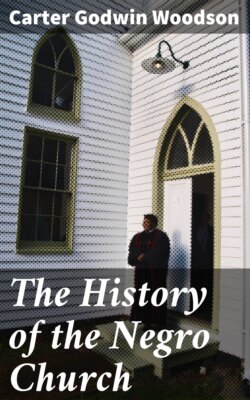Читать книгу The History of the Negro Church - Carter Godwin Woodson - Страница 9
На сайте Литреса книга снята с продажи.
CHAPTER IV THE INDEPENDENT CHURCH MOVEMENT
ОглавлениеTable of Contents
THE facts set forth above easily lead to the conclusion that the rise of the Negroes in the church was impeded by connection with their self-styled superiors. At first the whites had seriously objected to the evangelization of the Negroes, feeling that they could not be saved and, when the latter had been convinced of this error, many of them were far from the position of conceding to the blacks equality in their church organizations. Negroes in certain parts, however, were at first accepted in the congregations with the whites and accorded equal privileges. During the American Revolution when there was a tendency to give more consideration to all persons suffering from restriction, this freedom was enlarged. After the reaction following the American Revolution when men ceased to think so much of individual or natural rights and thought more frequently of means and measures for centralized government, the Negroes, like most elements far down, were forgotten or ignored even by the church. In this atmosphere of superimposed religious instruction the Negro was called upon merely to heed the Word and live. Experience soon taught, however, that it is difficult for a people to maintain interest in a cause with the management of which they have nothing to do.
Having enjoyed for some time the boon of freedom in the church, moreover, the Negroes were loath to give up this liberty. The escape of a young Negro, a slave of Thomas Jones, in Baltimore County in 1793 is a case in evidence. Accounting for his flight his master said: "He was raised in a family of religious persons commonly called Methodists and has lived with some of them for years past on terms of perfect equality; the refusal to continue him on these terms gave him offense and he, therefore, absconded. He had been accustomed to instruct and exhort his fellow creatures of all colors in matters of religious duty." Another such Negro, named Jacob, ran away from Thomas Gibbs of that same State in 1800, hoping to enlarge his liberty as a Methodist minister; for his master said in advertising him as a runaway: "He professed to be a Methodist and has been in the practice of preaching of nights." Still another Negro preacher of this type, named Richard, ran away from Hugh Drummond in Anne, Arundel County, that same year, while another called Simboe escaped a little later from Henry Lockey of Newbern, North Carolina.
This was the beginning of something more significant. The free Negroes in the North began to assert themselves after the manumissions incident to the American Revolution, as they were not necessarily obligated to follow the fortunes of the white churches. Such self-assertion early culminated in the protest of Richard Allen, the founder of the African Methodist Episcopal Church. Richard Allen was the very sort of man to perform this great task. He was born a slave of Benjamin Chew of Philadelphia but very soon thereafter was sold with his whole family to a planter living near Dover, Delaware, where he grew to manhood. Coming under Christian influence, he was converted in 1777 and began his career as a minister three years later. Struck with the genuineness of his piety, his master permitted him to conduct prayers and to preach in his house, he himself being one of the first converts of this zealous messenger of God. Feeling after his conversion that slavery was wrong, Allen's master permitted his bondmen to obtain their freedom. Allen and his brother purchased themselves for $2,000 in the depreciated currency of the Revolutionary War.
Richard Allen then engaged himself at such menial labor as a Negro could then find, cutting wood and hauling, while preaching at his leisure. Recognizing his unusual talent, Richard Watcoat on the Baltimore circuit permitted Allen to travel with him, and Bishop Asbury frequently gave him assignments to preach. Coming to Philadelphia in 1786, Allen was invited to preach at the St. George Methodist Episcopal Church and at various other places in the city. His difficulties, however, had just begun. Yet he could not but succeed because he was a man of independent character, strict integrity, business tact, and thrifty habits. When he spoke a word, it was taken at its face value. His rule was never to break a promise or violate a contract.[4]
